How to Cure PCOS to Get Pregnant?
Fertility Treatment
Polycystic ovary syndrome (PCOS) is one of the most significant female ovarian diseases that can occur in both adult women and teenage girls at different ages. PCOS treatment requires precise examinations to determine the severity of the disease.
Polycystic ovary syndrome is mainly caused by hereditary and genetic background rather than lifestyle and environmental factors. This condition occurs due to a disturbance in the growth and maturation of follicles containing eggs. This article discusses the cause of PCOS occurrence and how to diagnose and treat it.
What Is PCOS?
PCOS, or polycystic ovary syndrome, is one of the leading causes of female infertility; it is a condition in which the follicles in the ovary are not fully matured. About 5 or 6 follicles begin to grow in each menstrual cycle, among which one will fully mature. This egg then sends inhibitory signals that prevent the growth of other follicles.
Thus, the smaller follicles are destroyed, so the necessary resources and facilities for fertilization will only belong to the mature follicle. However, in women with PCOS, the matured follicle may be unable to release the egg and send inhibitory signals to prevent other follicles' growth.
Therefore, several half-grown follicles are formed every month that are neither destroyed nor fertile. These follicles will accumulate on the outer portion of the ovary (ovarian cortex) and will cause problems in ovarian function over time.
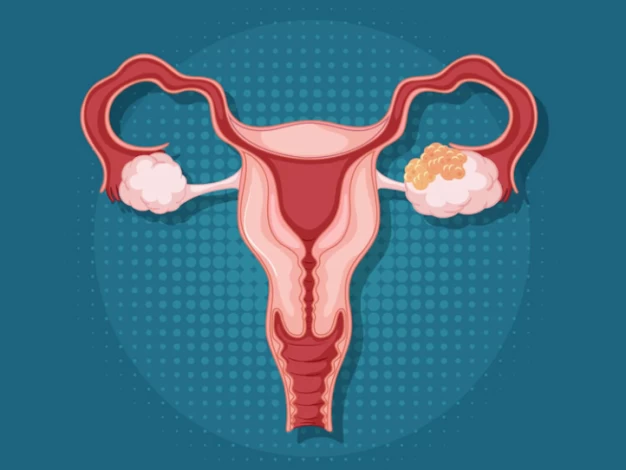
How Can PCOS Affect Pregnancy?
Everyone may have heard that women with PCOS have problems getting pregnant. The cause of female infertility with PCOS is due to hormonal disorders. The semi-grown follicles or cysts cause hormonal imbalance by continuously releasing male hormones in the blood. The more semi-grown follicles increase over time, the more severe this hormonal disorder will be.
Increased male hormones and disruption of the menstrual cycle result in complications such as irregular menstruation, cessation of menstruation, late fertility, and even infertility. It should be noted that PCOS can also be dangerous in women who do not intend to get pregnant since it increases the risk of uterine cancer from ages 40 to 50.
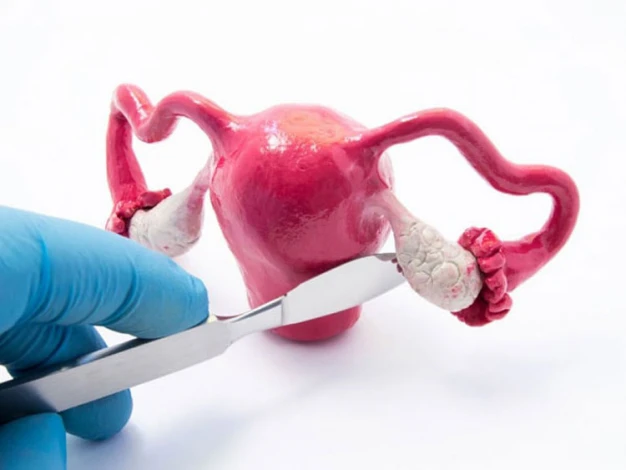
When Is the Best Time to Treat PCOS?
Considering the risk of PCOS occurrence in women of different ages, it is recommended that all women undergo annual and regular examinations by a gynecologist from the beginning of puberty.
As PCOS management and treatment may usually be time-consuming and slow, women with PCOS should be patient and not expect a sudden cure during PCOS treatment.
Although women with mild PCOS can sometimes reduce or stop taking hormonal drugs by following a healthy lifestyle, such as regular exercise, choosing a nutritious diet, and avoiding stress.
How to Diagnose PCOS?
There are different methods to diagnose PCOS. However, the best way is to perform an ultrasound to detect the presence of eggs with abnormal sizes and numbers. It should be noted that PCOS symptoms are not the same in all patients, and the condition may cause different symptoms depending on severity.
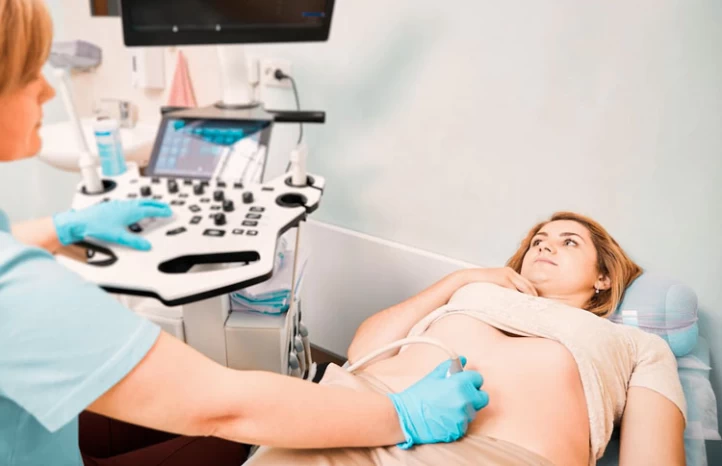
How to Cure PCOS Permanently?
There is no permanent 100% cure for PCOS. The genetic causes of PCOS have made it impossible to find a way to treat the condition completely.
However, best treatment for PCOS depends on the management of its symptoms and complications. Some hormonal or non-hormonal pills, medicines, and ovulation stimulation drugs can manage PCOS symptoms such as menstrual irregularity, male pattern baldness, hair loss, and infertility.
PCOS Treatments
As mentioned, PCOS's causes are mainly hereditary and genetic. However, the occurrence of its symptoms also depends on environmental factors. Patients can manage PCOS and prevent its severe complications by changing and improving their lifestyle, being at a healthy weight, consuming healthy foods, and being aware of the longevity of the condition.
In general, the seven main methods to help treat PCOS are as follows:
- Removing the follicles on the ovarian cortex with medication;
- Regulating the menstrual cycle;
- Following a healthy lifestyle;
- Regulating hormones with diabetes drugs;
- Performing laparoscopy for PCOS Treatment;
- Performing IUI procedure;
- Performing IVF procedure.
Removal of ovarian surface follicles with medication
One of the methods for treating PCOS and reducing its complications is to remove the follicles on the ovarian cortex with the help of some particular drugs. Accordingly, these follicles no longer overproduce male hormones, improving their complications.
Regulating the menstrual cycle
The absence or irregular periods in women is one of the symptoms of PCOS that requires medical treatment. The doctor prescribes the most appropriate PCOS medicines to regulate the menstrual cycle. Ovarian stimulation drugs can help women with PCOS suffering from menstrual irregularity and temporary female infertility. However, it should be noted that this method increases the possibility of twin or multiple births.

Following a healthy lifestyle
To reduce the symptoms of PCOS, patients should change their lifestyles and avoid unhealthy behaviors. Women diagnosed with PCOS at a young age can prevent the development of the condition to a large extent by following specific lifestyle tips and performing certain home remedies.
PCOS home remedies include:
- Regular exercising for about 150 minutes a week;
- Maintaining a healthy weight with a standard body mass index (BMI);
- Following a healthy diet;
- Getting pregnant at a young age to prevent the aggravation of the condition;
- Avoiding stress and anxiety;
- Reducing the consumption of sugary foods and drinks.
Regulating hormones with diabetes drugs
If women with PCOS do not intend to get pregnant, they can take diabetes drugs to improve their hormonal imbalance. The doctor can prescribe certain medicines to reduce insulin resistance and the male hormone androgen level. These drugs can also regularize menstruation and eliminate other symptoms of PCOS.
Performing Laparoscopy for PCOS Treatment
If drug treatments to manage the symptoms of PCOS cannot be effective after a few months, the doctor will perform a laparoscopy. The Laparoscopy surgery removes the adrenal glands that produce male hormones to reduce PCOS complications. During this method, 4 to 10 ovarian spots are usually cleaned. Therefore, there will be a chance of pregnancy in case of ovulation.
Performing IUI procedure
The IUI method can be used when natural pregnancy cannot occur in women with PCOS whose husband has high-quality sperm. This method involves injecting a male sperm directly into the woman's uterus.
Performing IVF procedure
Sometimes, in addition to ovulation disorders in women, the man's sperm does not have enough power to fertilize the egg. In such situations, it is better to use the IVF method, which involves egg fertilization in the laboratory and then transferring the resulting embryo to the mother's uterus.
What Is the Medicine for Polycystic Ovary Syndrome (PCOS) Treatment?
Considering the sensitivity of the condition and the possible side effects of drugs, patients should be careful in choosing and taking the best drug treatment for PCOS and pregnancy. Medications used to treat polycystic ovary syndrome are prescribed for different purposes. Therefore, no medicine should be taken arbitrarily without a prescription.
The most common drugs used to treat polycystic ovary syndrome are as follows.
Combined contraceptive pills
Women with PCOS can take combined contraceptive pills to regulate their menstrual period and reduce androgen levels with their estrogen and progesterone content. Combined contraceptive pills are among the best drugs for PCOS that restrict progesterone and other hormone levels and prevent complications such as irregular periods, acne, and excessive hair growth. These pills can also reduce the risk of endometrial cancer.

Progesterone Therapy for PCOS
Another way to regulate the menstrual cycle and reduce the risk of endometrial cancer is to take progesterone for 10 to 14 days every 1 to 2 months. It should be said that progesterone therapy cannot improve androgen levels and prevent pregnancy. Therefore, if women with PCOS intend to avoid pregnancy, they should take progestin-only minipills or use intrauterine hormonal devices (IUD).
Clomiphene
Clomiphene can enhance ovulation and increase the chance of pregnancy. Women with PCOS should take this oral anti-estrogen drug at the beginning of their menstrual cycle.
Letrozole (Femara)
Although Femara or Letrozole is often used to treat breast cancer, it can also affect ovulation stimulation and pregnancy.
metformin
Oral metformin treats type 2 diabetes by improving insulin resistance and reducing insulin levels. This drug can also help ovulation in women with PCOS.
Gonadotropins
Gonadotropins are effective in stimulating the ovaries and increasing the chances of pregnancy in women with PCOS. These fertility drugs are usually given by injection.
Birth control pills
Contraceptive pills are prescribed when the most serious complications in women with PCOS are acne and excessive hair growth. Birth control pills help treat and improve acne and hair loss by reducing androgen levels.
How to Treat PCOS in Unmarried Girls?
Girls with PCOS symptoms (including absent or irregular periods) can use various herbal and medical treatments. As irregular periods in the first months and years of menstruation are normal, PCOS treatment in young unmarried girls should be done after confirming the presence of the condition.
PCOS in young girls is due to the lack of proper growth of reproductive cells, which can cause early menopause in the future. This complication may occur due to surgery, radiation therapy, or hereditary and genetic problems. However, choosing the best treatment method should be done by a specialist, and it is not recommended for girls with PCOS to take arbitrary measures or postpone treatment.
How to Treat PCOS at Home?
As said, following a healthy lifestyle is the most important home remedy for PCOS complications. For example, consulting a nutritionist to have a weight control diet will result in regulated insulin and androgen levels, improved ovulation, etc.
Less consumption of carbohydrates is also effective in regulating insulin levels. Therefore, it is recommended that women with PCOS include complex carbohydrates in their diet to prevent a sudden increase in their blood sugar. Complex carbohydrates can be found in vegetables, fruits, whole grains, peas, cooked dry beans, etc.
Furthermore, regular exercise is a complementary solution for preventing insulin resistance and diabetes.
How Long Does It Take to Treat PCOS?
Several factors can affect the length of PCOS treatment. Also, since PCOS cannot be cured permanently, the condition's recurrence is possible.
The most important risk factors that affect PCOS treatment are as follows:
- Patient's age;
- Patient's family history;
- Presence of uterine fibroids;
- Environmental and lifestyle factors.
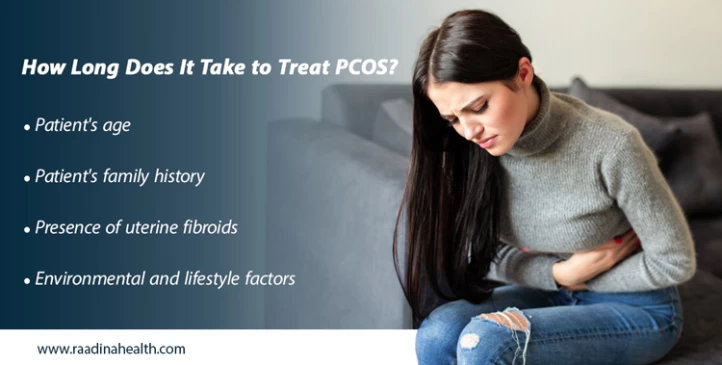
Read on to learn more about each.
Patient's age
Female fertility usually decreases from the age of 35. Women over 35 may have to try for more than one year to get pregnant, while women under 35 can get pregnant within a year. The male partner's age is also essential in producing healthy sperm. Therefore, trying to have children at younger ages can help treat PCOS symptoms and complications.
It should be noted that women with PCOS who are over 37 may require assisted reproductive technologies such as IVF to get pregnant.
Patient's family history
The success rate of PCOS treatment is higher in women who have no family history of PCOS. However, the treatment of PCOS will take longer in women or men with past genital warts and men with low sperm counts.
Presence of uterine fibroids
Uterine fibroids are benign noncancerous growths that may grow in women's uterine walls and cause female infertility. PCOS treatment and pregnancy will be more challenging in women with uterine fibroids and PCOS simultaneously.
Environmental and lifestyle factors
Being in toxic environments and having unhealthy lifestyle behaviors such as smoking or drug use, being overweight, and consuming unhealthy foods prolong the PCOS treatment.
When Is the Best Time to See a Doctor?
The best time to see a doctor for diagnosing and treating PCOS is maximally after three months of absent menstruation. Missing periods do not merely mean PCOS and may occur due to temporary stress, certain diseases, pregnancy, heavy exercise and activities, diet changes, etc. However, women with hormonal problems should see a doctor for an examination to ensure their health.

The Bottom Line
PCOS is a condition with no permanent cure that may cause severe complications, especially female infertility. Therefore, it is recommended for all women to have regular checkups with a specialist.
It should be noted that although PCOS cannot be cured permanently, a timely diagnosis of the condition can help manage many of its complications and symptoms.
Frequently Asked Questions about PCOS Treatment
1. Can PCOS be Cured Naturally?
PCOS cannot be cured on its own. However, appropriate management can help women with the condition lead healthy, fulfilling lives.
2. Can Homeopathy Cure PCOS Permanently?
Currently, no scientific evidence supports homeopathy as a polycystic ovary syndrome (PCOS) treatment. While some patients may report improvements in their symptoms with homeopathic remedies, there is no guarantee that these remedies will work for everyone.
3. Can I have PCOS but not have any symptoms?
Yes, a woman can have polycystic ovary syndrome (PCOS) without experiencing any symptoms. While homeopathy may not cure PCOS, some women may find it a helpful complementary therapy when used in conjunction with conventional treatments. However, discussing complementary therapies with a doctor before starting them is important, as some therapies may interact with medications or have other potential risks.
4. What is the role of diet in managing PCOS?
Diet can play a significant role in managing polycystic ovary syndrome (PCOS) symptoms, particularly for women who are overweight. Some dietary recommendations that may help manage PCOS include managing carbohydrate intake, avoiding highly processed food, and consuming healthy fats.
5. What Foods Should I Avoid with PCOS?
There are certain foods that women with PCOS may need to limit or avoid to help manage their symptoms. These foods include refined carbohydrates, sugary drinks, processed foods, red meat, and dairy products.
6. How long does PCOS treatment usually last?
PCOS treatment is usually ongoing and may need to be managed over time based on each patient's symptoms and response to treatment.
7. Can PCOS Be Genetic?
Women with a family history of PCOS may be at a higher risk of developing the condition. However, PCOS is a complex disorder, and genetic factors alone cannot cause the condition. Other factors, such as insulin resistance, hormonal imbalances, and environmental factors, may also play a role in the development of the condition.
8. Can PCOS cause a miscarriage?
Women with PCOS may experience early pregnancy loss or miscarriage, especially if they have other risk factors such as advanced maternal age, obesity, or other medical conditions such as diabetes. However, it is important to note that not all women with PCOS will experience miscarriage, and many women with PCOS can have successful pregnancies.
9. What age does PCOS start?
Polycystic ovary syndrome (PCOS) can develop at any age after puberty. However, most women are diagnosed with this condition in their 20s or 30s. Some girls may show signs of PCOS, such as irregular periods or excess hair growth during adolescence.




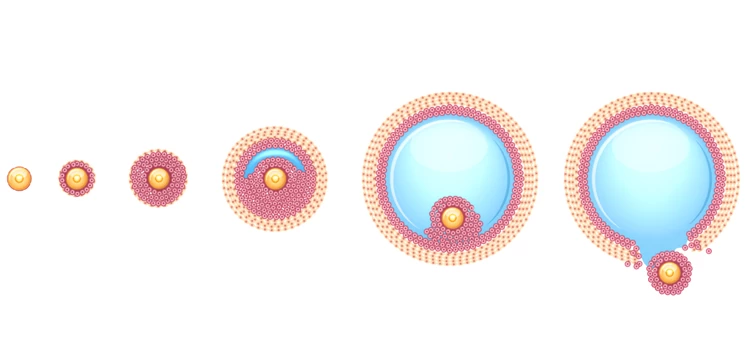
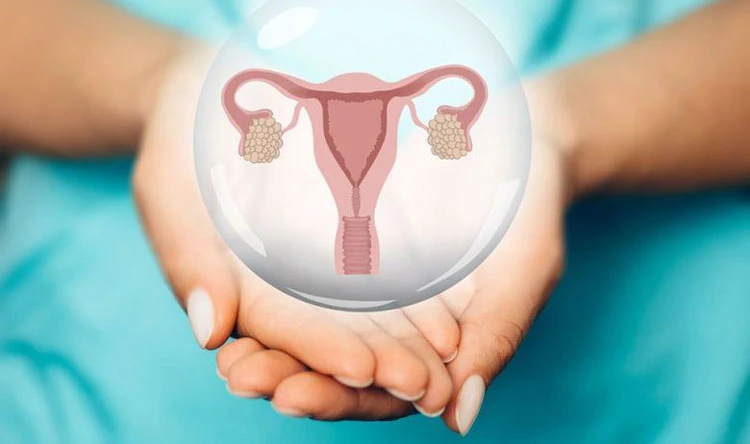
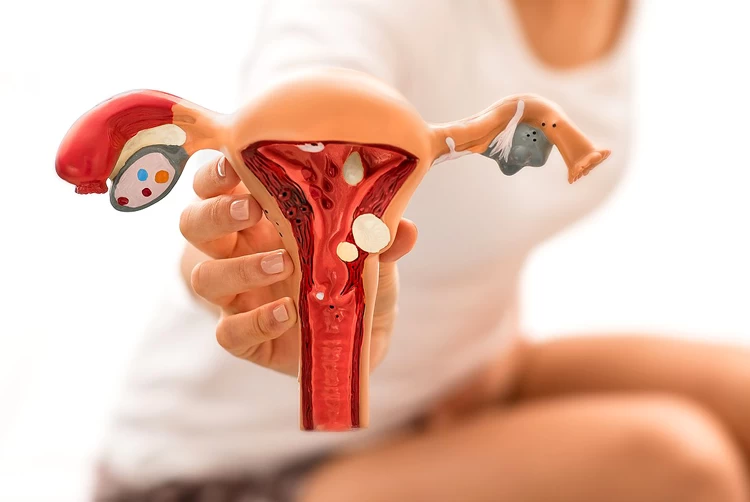








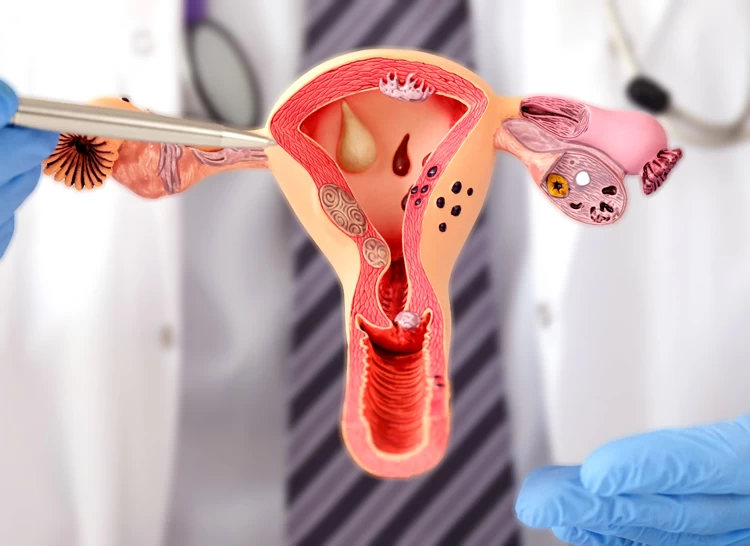

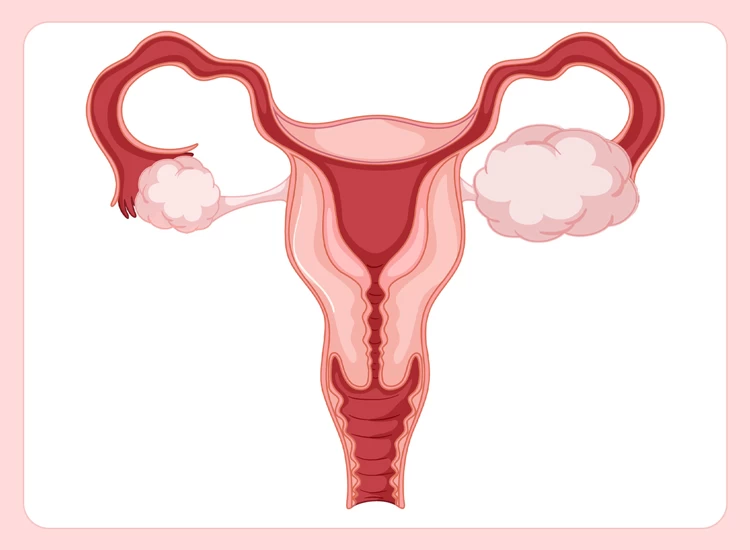
No reviews
Your comment